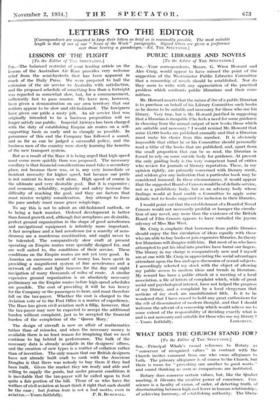PUBLIC LIBRARIES AND NOVELS [To the Editor of TuE SPECTATOR.]
SIR,—Your correspondents, Messrs. G. Wren Howard and Alec Craig, would appear to have missed the point of the suggestion of the Westminster Public Libraries Committee that a censorship of novels should be established. Nor do they seem to write with any appreciation of the practical problem which confronts public librarians and their com- mittees.
Mr. Howard asserts that the raison d'être of a public librarian is to purchase on behalf of his Library Committee such books as he deems to be suitable and necessary for those who use his library. Very true, but is Mr. Howard justified in suggesting that a librarian is incapable if he feels a need for some guidance in choosing from the annual output of new books those which are suitable and necessary ? I would remind Mr. Howard that some 15,000 books are published annually and that a librarian must make his choice from this number. It is obviously impossible that either he or his Committee should personally read a tithe of the books that are published, and, apart from the small proportion that can be so read, the librarian is forced to rely on some outside body for guidance. At present the only guiding body is the very competent band of critics who review for journals of literary reputation. These, in my opinion rightly, are primarily concerned with literary merit, and seldom give any indication that a particular book may be considered immoral. In these circumstances, it would appear that the suggested Board of Censors would be of definite service, not as a prohibitory body, but as an advisory body whose findings would at least enable a Committee to apply some definite test to books suggested for inclusion in their libraries.
I would point out that the establishment of a Board of Novel Censors would not necessarily prohibit or hamper the circula- tion of any novel, any more than the existence of the British Board of Film Censors appears to have curtailed the joyous odyssey of Miss Mae West.
Mr. Craig is emphatic that borrowers from public libraries should enjoy the free circulation of ideas equally with those who are able to buy books or join expensive libraries. In theory few librarians will disagree with him. But most of us who have attempted to put his ideal into practice have burnt our fingers. The library in my charge is comparatively new and I myself am at one with Mr. Craig in appreciating the social advantages attendant upon the free and open discussion of sexual subjects. I accordingly selected my stock with the object of allowing my public access to modern ideas and trends in literature. My reward has been a public attack at a meeting of a local association, a file of letters of complaint which, while of great social and psychological interest, have not helped the progress of my library, and a complaint by a local clergyman that sections of my stock are unadulterated filth. Is it to be wondered that I have ceased to hold any great enthusiasm for the rode of disseminator of modern thought, and that I should welcome the advent of a censorship which would relieve me to some extent of the responsibility of deciding exactly what is and is not necessary and suitable for those who use my library ?














































 Previous page
Previous page